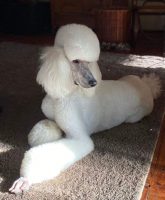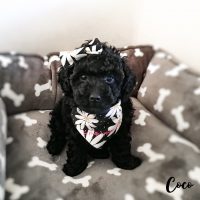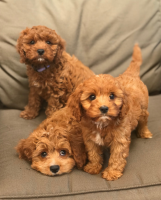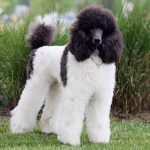 What is a Mini Poodle?
What is a Mini Poodle?
To be a registered Miniature Poodle, a dog must stand between 11″ and 14″ tall at the shoulder and weigh between 15 and 17 pounds. Mini Poodles are recognized as one of three sizes of Poodles by many worldwide dog breed associations, including the American Kennel Club, the FCI, the Canadian Kennel Club, and the Kennel Club of the UK. They are popular show dogs and pets on almost every continent.
Coat Colors and Grooming
Recognized coat colors within the breed include the basic base colors of red and black. Mini Poodles also carry dilution genes, meaning they can be blue, silver, cream, and apricot (or fawn.) Silver and brown are also acceptable for registration, as is solid white. It should be noted, however, that “acceptable for registration” and “genetically possible” are not the same thing. “Off-color” dogs such as those with a black and tan coat, also called “phantom,” sable, ticked, and parti-color (Irish pattern) do occur in the lines from time to time. All of these colors are considered to be recessive at this time and can stay hidden until two carriers are bred together.
The Miniature Poodle dog’s coat may be either curly or, rarely, corded. The curly coat sheds less than other dogs and is considered to be ‘hypoallergenic’ for people with dog hair allergies for this reason. Time must be taken in caring for a Poodle’s coat and it must be groomed at most every six weeks, though some dogs need a trim in half that time. Poodles need their nails clipped at least every other month, and their teeth should be cleaned at that time, as well.
For showing purposes, a Mini Poodle’s coat should be groomed to best accent their sturdy build and square conformation. A puppy clip is permitted in the show ring on dogs that are under one year of age. This involves the shaving of the face, throat, feet, and base of the tail, leaving the rest of the coat long and full.
Adult dogs are permitted to have their coats clipped into either the English Saddle Clip, or the more well recognized Continental Clip. The English Saddle clip, also known as the modified Continental Clip, leaves more hair on the hind legs than the Continental Clip. The hair is styled into pompoms down the legs and the hair on the tail is left longer. The face, throat, feet, and base of tail are shaved.
The Continental Clip leaves longer hair on the front of the body, while the hind legs, all four feet, and face are shaved. A pompom of fur is left on the tail and over each hip; the dog also wears bracelets of thick fur around their ankles. This type of clip is the most historical for the Poodle breed, as the dogs were originally bred as water retrievers. The hair is left full over vital organs. This hair allows the organs to stay warmer as the rest of the coat dries more quickly. The Continental Clip is the one style of dog grooming that most people are familiar with and think of when they hear the word “poodle.”
Training and Socialization
Mini Poodles are intelligent and energetic dogs. They tend to get along well with other animals and children, especially if socialized from a young age. Obedience training is especially useful for these dogs, as they can be overly sensitive and develop barking issues. Some Miniature Poodles can be shy of strange people and animals. They are great pets and do well in apartments.
Miniature Poodles are capable of learning a wide range of tricks and do well in many canine disciplines. Though their larger counterparts were hunting dogs, the smaller versions have been lap dogs, guard dogs, and circus performers. Many registered dogs compete in conformation shows, obedience, and agility. Some are even enjoying the relaxed atmosphere of dock diving.
Health
The lifespan of the Miniature Poodle is, on average, between 12 and 15 years. They tend to be relatively healthy overall, though there may be concerns about issues such as epilepsy, blindness, and joint problems. Purchasing a Miniature poodle from a reputable dog breeder will help lower the risk for major health problems in the long run. Reputable breeders will not only health screen and genetically test their breeding stock, they will have proof that they have done these things.







